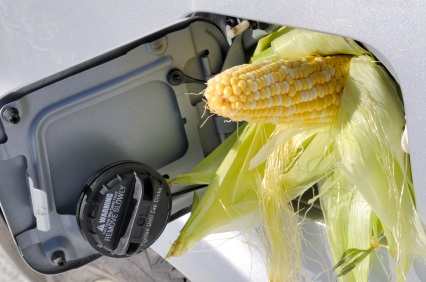 In its calm and measured way, the Congressional Budget Office (CBO) just delivered a blistering assessment of the environmental value of corn-based ethanol.
In its calm and measured way, the Congressional Budget Office (CBO) just delivered a blistering assessment of the environmental value of corn-based ethanol.
The CBO had been charged by Congress to calculate just what the public is getting for its investment in ethanol production: specifically, the $0.45/gallon tax credit that gasoline blenders get for mixing ethanol into the fuel supply. In 2009, 10.8 billion gallons of corn ethanol got used in such a manner, costing the federal Treasury $5.16 billion in reduced tax revenue.
What did we get for that fat wad of cash, in environmental terms? The question is critical, because that long-entrenched tax break is set to expire later this year — and the ethanol industry is scrambling to extend it, with the full support of the Obama administration, Associated Press reports.
As the CBO report [PDF] makes clear, the environmental case for the tax break is bankrupt. The reports runs 28 pages, but I can boil it down to two points.
1. Subsidizing corn-based ethanol is an mind-numbingly expensive way to reduce greenhouse gas emissions.
Using the friendliest assumptions possible (note that some prominent researchers argue that ethanol actually generates more GHG emissions than gasoline), CBO reckons that by supporting ethanol through the tax break, taxpayers are shelling out about $750 for every metric ton (2,205 pounds) of carbon kept out of the atmosphere by ethanol. To put that number in perspective, note that the carbon-offset company Terrapass values 1,000 pounds of emissions reductions at $5.95. Converting that to metric tons, Terrapass charges about $13 to do what the ethanol industry is charging us $750 for.
If greenhouse gas reductions are the goal, merely handing $5.16 billion to Terrapass to buy offsets would be about 57 times more effective than subsidizing ethanol production.
Of course, from my perspective, a far more effective use of that money would be to invest in technologies and infrastructure that reduce energy consumption altogether, like mass transit. But using it to encourage people to convert corn into car fuel is surely madness.
2. Corn-based ethanol is really just a clever way to convert natural gas and coal into car fuel.
The CBO report states the case bluntly: “Because the production of ethanol draws so much energy from coal and natural gas, it can be thought of as a method for converting natural gas or coal to a liquid fuel that can be used for transportation.”
The CBO is referring to the fact that it requires lots of energy to convert a bushel of corn into engine fuel, and most ethanol plants are powered by natural gas; the rest by coal. And that doesn’t account for the vast amount of synthetic nitrogen fertilizer needed to grow the corn in the first place. Synthesizing nitrogen, too, requires huge amounts of natural gas.
The environmental devastation associated with coal use is well-known. As for natural gas, it’s often hailed as a “clean” alternative to other fossil fuels; but that reputation is crumbling as the the natural gas industry comes to rely more on the highly polluting process of hydraulic fracturing, or “fracking,” which has its own nasty baggage.
Overall, the CBO’s assessments could be summarized like so: The environmental benefits of propping up corn-based ethanol production are scant at best — and extremely expensive.
Now, ironically, even if the $0.45 per gallon tax break ends on schedule later this year, we’ll still see increased ethanol production over the next several years. That’s because the 2007 Energy Act established a “renewable fuels mandate” that requires steadily increasing corn-based ethanol production until 2015, when it’s due to top off at 15 billion gallons (up from last year’s 10.8 billion gallons).
The corn ethanol juggernaut, no matter how absurd, will not be denied. But lavishing it with billions in tax breaks on top of the mandate can not be justified.


